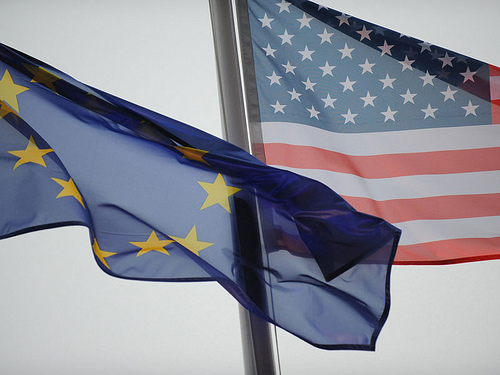
As the Munich Security Conference and EU summit are underway, uncertainty in Egypt remains a focal point.
HEADLINES:
Europe faces flak on Arab policy as summit opens (Radio Netherlands Worldwide)
Europe’s leaders gather for a summit Friday under attack for a slow response to violence in Egypt and for tolerating authoritarian regimes in their backyard as bulwarks against Islamist extremism.
Piracy: No stopping them (The Economist)
THE first successful pirate attack of 2011 could scarcely have come more promptly. In the early afternoon of January 1st, monitors at the Maritime Security Centre-Horn of Africa, based in Northwood near London, picked up distress signals from the MV Blida.
EU leaders urge dialogue, end to violence in Egypt (AP)
British Prime Minister David Cameron said that if the Egyptian regime uses violence on protesters in Cairo on Friday it will lose any remaining international credibility it has left.
‘Europe Doesn’t Need More Germany’ (Spiegel Online)
German Chancellor Angela Merkel and French President Nicolas Sarkozy have presented their vision for saving the euro zone to EU leaders at a summit in Brussels. The bold plan foresees countries taking radical steps to sort out their finances and cut down on debt. In short, become more German. And therein, argue German commentators, lies the rub.
Cold War finally ending in Mideast, says Turkish foreign minister (Hurriyet Daily News)
Colonization and the effects of the Cold War have prevented the Middle East from “normalizing” until the present day, Turkish Foreign Minister Ahmet Davutoğlu has said in reference to protests currently engulfing the Arab world.
Security is a moveable feast at Munich conference (Deutsche Welle)
What started in 1962 as a modest gathering of ageing gentlemen has gradually become one of the most important dates on the global security policy calendar. This year’s Munich Security Conference gets underway on Friday.
Franco-German fiscal pact faces opposition (EurActiv)
After France and Germany presented plans for a fiscal union in Brussels today (4 February), some EU partners reportedly indicated reluctance to accept the proposals. But according to a clause in the Lisbon Treaty, not all countries would have to sign up for the union, say sources.
EDITORIALS AND COLUMNS:
Return of the Turks as Middle East kingmaker (Foreign Policy)
"Enough we say, the decision belongs to the people of the brotherly Egyptian and Tunisian nations… Turkey shares the grief of these nations as well as their hopes." So-declared a self-confident Turkish Prime Minister Recep Tayyip Erdogan on Tuesday in his prime-time speech on recent events in the Middle East that received broad coverage regionally. While commentators point to the protests and revolutions in the Arab world as being the most recent example of the crumbling vestiges of the Cold War, the more significant long-term global trend is strangely familiar to the Turks. Protests in Tunisia have already overthrown the rule of a 23 year-old regime and inspired a similar uprising in the form of Egypt’s ongoing protest movement. Lebanon’s continuing instability and threats of Tunisian-inspired revolutions in Yemen and even Jordan further add to the significance of the moment we are witnessing in the Arab world.
After Belarus sanctions, what about Ukraine? (EUObserver)
The decision on sanctions against Belarusian leader Aleksander Lukashenko and the wide range of Belarusian officials is very encouraging for many in Ukraine. At the same time, it is very difficult to have any optimism about where President Yanukovich is taking the country.
The Mediterranean between sunny skies and clouds of pessimism (The Daily Star)
For most Europeans, the Mediterranean is an annual object of longing. It is a place for their holiday idyll, where they spend the best weeks of the year. But many Europeans’ sunny view of the region has also yielded recently to lowering clouds of pessimism.
We all helped suppress the Egyptians. So how do we change? (The Independent)
The old slogan from the 1960s has come true: the revolution has been televised. The world is watching the Bastille fall on 24/7 rolling news. An elderly thug is trying to buy and beat and tear-gas himself enough time to smuggle his family’s estimated $25bn in loot out of the country, and to install a successor friendly to his interests. The Egyptian people – half of whom live on less than $2 a day – seem determined to prevent the pillage and not to wait until September to drive out a dictator dripping in blood and bad hair dye.
Compiled with the assistance of Klée Aiken.
Image: transatlantic.jpg
